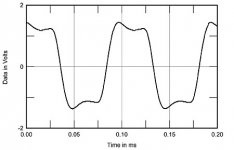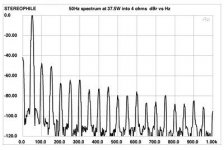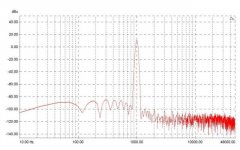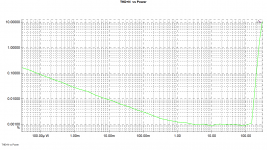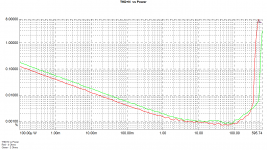Well i guess the death of tubes John , finally .....
Not likely.
Tubes have their loyal fan following, just like every other semiconductor device. I love silicon, in electronics and elsewhere, others swear by FETs and MOSFETs, vertical or lateral or skewed or whatever, and so forth. This is not going to end just because there's a new technology around.
Besides, that's still a young technology, still struggling with emerging teeth, it will take time for it to mature, but in the end, it will. It will become a VERY serious contender in the audio arena, for some because it will go cheaper still and yet more compact - witness how digital amps found their way into TV sets real fast.
That notwithstanding, as long as there are people like our own Wavebourne here, who are intimately acquainted with the nuances of tubes, they will survive and hopefully produce better yet results, i.e. evolve. The fact that tubes are not really mainstream any more means little in dedicated circles.
JC and I will be fondling transistors for a long time yet, Thorsten will cheers for the lateral FETs and Nige will be somewhere in between.
But, I am willing to bet that that each and every one of us will eventually own a digital amp or two just to satisfy our curiosity, if for no other reason. Or a hybrid, multiway system, for exmple, in my case, a digital amp for the bass capable of serious power and two smaller power, pure class A amps for the midrange and the treble. I'm not a tube man, but if I should discover that tubes give me a better treble than BJTs, digital for bass, analog for the mid and tubes for the treble - why not?
snip/
But, I am willing to bet that that each and every one of us will eventually own a digital amp or two just to satisfy our curiosity, if for no other reason. Or a hybrid, multiway system, for exmple, in my case, a digital amp for the bass capable of serious power and two smaller power, pure class A amps for the midrange and the treble. I'm not a tube man, but if I should discover that tubes give me a better treble than BJTs, digital for bass, analog for the mid and tubes for the treble - why not? /snip
There is no such thing as an digital amplifier, class D is 100% analogue!
http://www.hypex.nl/docs/papers/AES120_353BP.pdf
Last edited:
umm... Mark's reply has a point, because 'digital' has very precise implications and there is nothing digital in a class D amp. it's more than a matter of wording, IMO. they can be digital (power DAC or other variations) but as it is generally accepted class D means nothing more than switching output stage. the same reasoning can be applied to switch mode supplies and say that the voltage they provide is digital. or to PWM controllers for electrical motors and call the way they rotate digital.In that case, why even talk about them, we all have analog amps already?
Should I call my little amps class Y, so I'm all new while being old?
Last edited:
umm... Mark's reply has a point, because 'digital' has very precise implications and there is nothing digital in a class D amp. it's more than a matter of wording, IMO. they can be digital (power DAC or other variations) but as it is generally accepted class D means nothing more than switching output stage. the same reasoning can be applied to switch mode supplies and say that the voltage they provide is digital. or to PWM controllers for electrical motors and call the way they rotate digital.
Thanks to Mark and you for bringing this up. Very few appreciate the distinction between digital and analog domains. Putzeys likes to call the former the "symbol domain", and some say "numeric domain", but the conflation persists among many of equating switching circuits to digital circuits.
There are now many products with digital processing of digital inputs to produce a pulse output, which is in the analog domain, since the height, width, timing, etc. of that output's pulses are crucial determinants of the reconstructed signal that's fed to the load. Somehow many still believe that this signal is digital (and therefore somehow "better"). Philips (now NXP) did us the service of referring to their integrated output switch as a "One-bit DAC", a product that found its way into various "digital" amplifiers as the output stages.
The power supply rejection of a simple output switching stage is terrible. TI had to add analog feedback to their recent products to make them less susceptible. Others have added ADCs etc. with feedback to the digital modulator. These schemes have their proponents, but stepping back a bit one has to wonder how so many have embarked on the careers of contortionists.
I had a potential client once who had a massively multichannel system, the initial realization of which used multiple analog signals to the amps. It was clearly desirable to distribute the signals in the digital domain, but less clear what to do with them when they were received at each powered speaker. A previous consultant had elected to use 8 channel "digital" amplifiers per cluster of drivers. What could go wrong?
Well, it turned out that the particular parts had a random component of synchronization with the incoming bitstream. The eight outputs were always in relative sync, but multiple 8-channel amps were not. The effect on the Hugyens-principle wavefront synthesis approach was devastating.
After having figured out how to salvage the situation with a lot more hardware and the existing amps, I gently proposed the alternative of deterministic DACs and conventional PWM amplifiers. I pointed out that it would work a lot better, since the amps had decent power supply rejection that the existing amps sorely lacked.
The client was horrified! ANALOG??!!!!
Now having said all of this, hybrid techniques and approaches may have merit. There are things easy to do in the digital domain, such as time delay, that can be used to advantage.
I just found recently about a new Yamaha invention (I predict that the future will bring a gazillion new 'hybrid' technologies) called EEEngine. it's an A/B output stage powered by a class D amp that tracks the output, providing just enough overhead.
don't see any intrinsic advantage (quite the contrary, you rely on supply rejection) but those engineers need to feel useful too LOL.
in my book digital = discrete. be it in time or amplitude (in reality, both). a D-amp that can only switch at predetermined moments in time would indeed be digital. but that is generally not the case.
don't see any intrinsic advantage (quite the contrary, you rely on supply rejection) but those engineers need to feel useful too LOL.
in my book digital = discrete. be it in time or amplitude (in reality, both). a D-amp that can only switch at predetermined moments in time would indeed be digital. but that is generally not the case.
I can't help but remember about the people who think that a D-amp (I call them that just for the sake of brevity) begs for digital. the power DAC, for instance. as in basically a high-current implementation of a R2R DAC. yes, I once heard someone actually talking about it. I know, it seems seductive but even a superficial analysis would reveal that it would bring more problems than solve. hell, even the R2R DACs aren't exactly naive implementations of the principle (DEM and all that). but a power version that is supposed to be better?The power supply rejection of a simple output switching stage is terrible. TI had to add analog feedback to their recent products to make them less susceptible. Others have added ADCs etc. with feedback to the digital modulator. These schemes have their proponents, but stepping back a bit one has to wonder how so many have embarked on the careers of contortionists.
this is what Bruno calls 'philosophy', I prefer to call it 'dogma'. sticking to apparently 'pure' (read naive) implementations while ignoring all the problems reality brings just because in our minds we associate simple with better. even at an abstract level those aren't necessarily connected.
Last edited:
No, it can't, it's an 8 Ohm car.
I know , hence, Mr Push pulls lack of response on the subject ...
There is no such thing as an digital amplifier, class D is 100% analogue!
http://www.hypex.nl/docs/papers/AES120_353BP.pdf
Yes, it's an oxymoron nomenclature , err, i think i got that right ...
In the hypex area , a one was claiming to better his JC-1's with one , interesting to say the least, my last attempt at comparing class-d , was my Bel canto vs my Threshold S500 and krell KSA200s , the Bel Canto's was easily bettered in everything except size and heat ...
Last edited:
nothing much to add. my current speakers simply don't go below 4.something ohms and they're impedance equalized.I know , hence, Mr Push pulls lack of response on the subject ...
reportedly, there are people switching from Audio Research, Pass Labs or Accuphase to class-D but that don't say much.In the hypex area , a one was claiming to better his JC-1's with one , interesting to say the least, my last attempt at comparing class-d , was my Bel canto vs my Threshold S500 and krell KSA200s , the Bel Canto's was easily bettered in everything except size and heat ...
I personally know this guy who owns a respectable system (Meridian 808 player, Raidho X-3 speakers, YBA Passion amp) who switched from a ICE-Power based Jeff Rowland. when I asked about his reasons he said (not exact quote but the idea is intact) "well, I had the money then, the YBA looked nice and it seemed better. would I do it again, knowing what I know now? no. the JR was a superb amp, I could happily live with it".
but then again, that is not direct experience.
and I know about people who (money let aside) on at least one occasion preferred class A/B output stages to class A ones. in the light of that, if I were to be malicious, I'd think about the First Watt groupies that would die defending them, when even Nelson Pass himself emphasized on more than one occasion that they were meant to drive easy loads and no more. we all know (well, maybe not exactly all) that the commercial Pass Labs amps are not exactly First Watt amps in a nice case. I know this guy who built more than one of the DIY Pass designs and also serviced some Pass Labs amps. his words were "they don't sound the same and they're not made the same. you're a fool to think you can get a Pass Labs amp on the cheap just by building a FW". so, what I am to make of the FW "this is the best amp ever" fan boys?
c'mon, we all know better.
Last edited:
Class-d brings a certain kind of energy to the music that is missing with class-a amplifiers, the music kinda springs to life like real music, it loses out in the bass and high frequencies, it's like comparing analog to digital sound, there is a lack of air and space to the sound accompanied by an electronic edge ..
Some are sensitive to it , others not , same for cd vs LP ....
It did not work for me at the time and I'm not sure how it compares to the NC400 or the other Hypex stuff( im looking into one at this time) but like everything in audio , no one item for everyone or every situation ...
regards,
Some are sensitive to it , others not , same for cd vs LP ....
It did not work for me at the time and I'm not sure how it compares to the NC400 or the other Hypex stuff( im looking into one at this time) but like everything in audio , no one item for everyone or every situation ...
regards,
FWIW I thinks that amps from -for example- Pass Labs do sound nice. And that's exactly the problem I have with these amps, they have a sound of their own (distorsion!)
The Hypex nCore and UcD amps are very, very neutral sounding (at least to me) backed up with measurements. But the Hypex range of amps represents just 1 method of designing a class D amp. The topology used (self oscillating with the output filter in he feedback loop) has some clear benefits (load independent behavior, low output impedance, low THD+N).
To me HiFi is about the most accurate reproduction possible, and this is one of the ways to get there. Not the only way
The Hypex nCore and UcD amps are very, very neutral sounding (at least to me) backed up with measurements. But the Hypex range of amps represents just 1 method of designing a class D amp. The topology used (self oscillating with the output filter in he feedback loop) has some clear benefits (load independent behavior, low output impedance, low THD+N).
To me HiFi is about the most accurate reproduction possible, and this is one of the ways to get there. Not the only way
but doesn't class A measure poorly as they don't (generally) use a lot of negative feedback?Yeah but doesn't class-d measure's poorly and they use a lot of negative feedback '
harmonic distortion:
Attachments
Last edited:
Plot generated using Prism Sound dScope III.
Distortion starts high, lowers then knee the rotation starts right at about 150 watts regardless of the load , so it's a 150 watt amp in 8/4/2 for best sonics , does have good drive ...
Distortion starts high, lowers then knee the rotation starts right at about 150 watts regardless of the load , so it's a 150 watt amp in 8/4/2 for best sonics , does have good drive ...
Attachments
Last edited:
but doesn't class A measure poorly as they don't (generally) use a lot of negative feedback?
harmonic distortion:
This is not true of the genre, search again ...
Datasheet of the Hypex amps I use, I think they measure (and sound) rather nice. http://www.hypex.nl/docs/UcD400HG_datasheet.pdf
@Mark, @Brad
Perhaps I was misunderstood, probably due to my misleading formulation of the text.
I am in no way disagreeing, discussing or, God forbid!, in any way belittling Mark's comment on "digital" class D amps being actually analog below the bonnet. While it was technically correct, the truth is that in the general public, class D is referred to as being digital.
Given my lacklustre experience with them so far, I have not taken any interest in them, and am hence unaware of the state of matters at this time. They quite simply sounded too shut in for my taste, I am far too used to a wide and deep soundstage to be one bit interested in listening to the same, but shut into a 4 by 4 metre room. To me, a 64 person symphonic orchestra cannot be put into such a small space, except possibly by using nano technology.
That's all there is to it.
And, just for the record, I have not yet encountered Hypex products in vivo.
Perhaps I was misunderstood, probably due to my misleading formulation of the text.
I am in no way disagreeing, discussing or, God forbid!, in any way belittling Mark's comment on "digital" class D amps being actually analog below the bonnet. While it was technically correct, the truth is that in the general public, class D is referred to as being digital.
Given my lacklustre experience with them so far, I have not taken any interest in them, and am hence unaware of the state of matters at this time. They quite simply sounded too shut in for my taste, I am far too used to a wide and deep soundstage to be one bit interested in listening to the same, but shut into a 4 by 4 metre room. To me, a 64 person symphonic orchestra cannot be put into such a small space, except possibly by using nano technology.
That's all there is to it.
And, just for the record, I have not yet encountered Hypex products in vivo.
Yeah but doesn't class-d measure's poorly and they use a lot of negative feedback '...
Bel Canto mono's 10khz square wave ....
Not all class D amps measure badly, and what's wrong with negative feedback as applied in the UcD & nCore examples I used? (Yes I just opened that can of worms
that is a well respected design. note that I erased the name. I can post many resembling HD plots.This is not true of the genre, search again ...
there are few class A amps measured by Stereophile that failed to reproduce a satisfying 10kHz wave. my point is that as long as we quote the measurements that we like to quote, we're going nowhere. I still don't see how a "perfectly" (note the quotes) reproduced 10kHz square wave relates to good sound while a distortion plot has nothing to do with it. yes, one can feel that an amp is subjectively not fast enough and intuitively relate that to square wave response but I'm yet to be convinced there's a direct connection.
@dvv
so you didn't like a class D amp, perfectly fine. but what does that have to do with them being digital? and what does the perception of the general public have to do with this discussion? not exactly hard facts.
Last edited:
- Status
- Not open for further replies.
- Home
- Member Areas
- The Lounge
- Sound Quality Vs. Measurements
